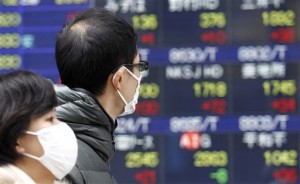
People walk by a stock price display of a securities firm in Tokyo Monday, Dec. 17, 2012. Asian markets were mixed Monday, with Japanese shares soaring and the yen tumbling after a landslide election win for the conservative opposition. AP PHOTO/KOJI SASAHARA
HONG KONG—Asian markets were mixed Monday, with Japanese shares soaring and the yen tumbling after a landslide election win for the conservative opposition.
The Japanese currency hit a year-and-a-half low against the dollar and multi-month lows versus the euro, a boon for exporters, as investors bet on more central bank easing by the country’s incoming government.
Tokyo climbed 0.94 percent, or 91.32 points, to 9,828.88, Sydney closed down 9.7 points, or 0.21 percent, at 4,573.4 and Seoul shed 0.60 percent, or 11.97 points, to 1,983.07.
Hong Kong shed 0.41 percent, or 92.37 points, to 22,513.61 but Shanghai ended up 0.45 percent, or 9.71 points, at 2,160.34 on hopes for pro-growth domestic policies from Beijing to boost the economy after a key meeting at the weekend.
China “will continue to implement the proactive fiscal policy and prudent monetary policy in 2013” and make increasing domestic demand a top priority, state media said Sunday after a key conference that sets the nation’s economic goals.
In Japan the Liberal Democratic Party (LDP) was expected to oust the ruling Democratic Party of Japan (DPJ), and its leader Shinzo Abe has vowed to press for a more aggressive economic policy to kickstart the economy.
“The election results were very much in line with market expectations. A relief rally is in order, helped by the stronger dollar,” SMBC Nikko Securities general manager of equities Hiroichi Nishi told Dow Jones Newswires. “Next, investors will be eager to see the kinds of concrete policy measures that the new government proposes.”
Tokyo Electric Power (TEPCO), operator of the Fukushima nuclear plant, soared almost 33 percent, leading a rally in energy firms on expectations the new government will likely shelve any short-term plans to ditch atomic power.
The DPJ vowed this year to ditch nuclear power by 2040, bowing to public pressure as thousands gathered to protest outside Noda’s official residence.
But it quickly backpedalled on that pledge with a more vague promise to work toward a nuclear-free country.
The business-friendly Liberal Democratic Party leader Shinzo Abe derided the zero-nuclear goal as unrealistic and “irresponsible” – and hinted at keeping atomic power.
In currency markets the dollar soared to 84.30 yen in early Tokyo trade, its highest since April last year, before easing back to 83.77 yen in early European trade, still well up from 83.52 yen in New York on Friday.
The euro also hit 111.10 yen, its highest since April this year, but slipped back to 110.16, compared with 109.94 yen in New York Friday.
The single currency also bought $1.3149, from $1.3161.
Traders are keeping an eye on Washington, where lawmakers continue to haggle over an agreement to avoid the huge tax hikes and spending cuts due to take effect next month, which are expected to tip the country into recession.
However, The Washington Post said that Republican House Speaker John Boehner had offered Friday to include tax rises for millionaires that would bring $460 billion in revenue over the next decade.
While the figure is about half of what President Barack Obama wants, it represents an important concession in the bitter face-off just two weeks before the deadline.
On Wall Street Friday, before the Boehner offer, the Dow lost 0.27 percent, the S&P 500 fell 0.41 percent and the Nasdaq shed 0.70 percent.
Oil prices rose, with New York’s main contract, light sweet crude for delivery in January up 28 cents to $87.00 a barrel in the afternoon and Brent North Sea crude for February delivery advancing 26 cents to $108.44.
Gold was at $1,690.10 at 1040 GMT compared with $1,696.80 late Friday.
In other markets:
— Taipei fell 0.88 percent, or 67.49 points, to 7,631.28.
Taiwan Semiconductor Manufacturing Co. lost 1.42 percent to Tw$97.0 while Hon Hai Precision Industry dived 4.7 percent at Tw$87.2.
— Manila fell 1.46 percent, or 83.26 points, to 5,623.85.
SM Investments Corp. slid 3.32 percent to 816 pesos while BDO Unibank dropped 2.74 percent to 70.90 pesos.
— Wellington fell 0.32 percent, or 12.69 points, to 3,966.49.
Fletcher Building was down 1.45 percent at NZ$8.14, Contact Energy was off 0.60 percent at NZ$5.01 and Telecom ended up 0.19 percent at NZ$2.16.
— Jakarta ended up 6.99 points, or 0.16 percent, at 4,315.86.
Carmaker Astra International rose 1.34 percent to 7,550 rupiah and Bank Permata jumped 2.36 percent to 1,300 rupiah,
— Kuala Lumpur shares lost 3.40 points, or 0.21 percent, to 1,648.58.
AirAsia fell 1.9 percent to 2.62 ringgit while Maxis slipped 0.9 percent to end at 6.50. Tenaga Nasional edged up 0/6 percent to closr at 6.82 ringgit.
— Singapore closed down 0.31 percent, or 9.73 points to 3,158.70.
Fraser and Neave gained 0.63 percent to Sg$9.63 and City Developments added 1.55 percent to Sg$13.12.
— Bangkok added 0.04 percent, or 0.59 points, to 1,359.09.
Coal producer Banpu gained 4.98 percent to 422 baht, while Siam Cement lost 2.38 percent to 410 baht.
— Mumbai slid 0.38 percent, or 72.38 points, at 19,244.42.
India’s mobile phone giant Bharti Airtel fell 3.69 percent to 300.45 rupees while top software exporter TCS ended down 2.83 percent to 1205.85.